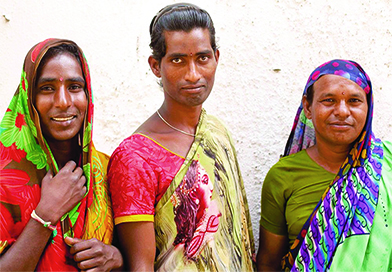Special Feature: India’s ‘Third Gender’ Is Marginalized and Sanctified
Beams of cathedral light illuminate the empty innards of overgrown warehouses on the outskirts of Mumbai. For most of the locals, the abandoned, British-colonial-era buildings serve as a latrine. But for Kali (not her real name), stepping carefully among piles of excrement, it is a workplace.
The 30-year-old is a hijra, the pan- Indian term used to describe cross dressers, naturally intersex people, or transgender women. Stats on hijras are limited, but their numbers have been estimated to be as high as 6 million. The word itself originates from the Semitic root hijr, meaning to leave one’s tribe. It is an apt etymology, as hijra live on the edges of society, outcast by their kin.
“I am a ghost,” Kali lamented. “I cannot be part of my family. It’s against their reputation, what I am today.”
Her gender awakening began at nine, but she lived as a male for years to protect her four sisters. “If I had become hijra,” she explained, “it would have been difficult for them to find a good marriage proposal. So I opened up myself late.”
The only regular family contact she currently maintains is with her mother. “Maybe once a month I dress like a man and go to stay the night with her,” Kali said. “I leave in the morning. The neighbors ask about me, about my long hair and why I look different nowadays.” I told Kali that I was working on a project collecting dreams from around the world, and asked about her own.
Often, I dream of being at a family celebration. I am wearing a sari, but they accept me as I am. They are happy with me, sharing all the joys of life. When I wake up, I am alone.
Paradoxically, for hijra like Kali, the same gender ambiguity that makes her a social pariah also grants her a holy status among some Hindus. Hijra are associated with Shiva, god of destruction, who is often worshipped in lingam form—as a stylized fusion of male and female genitalia. This coupling of the masculine and feminine symbolizes an inseparable cosmic unity. Hijra are also associated with the mother goddess Yellamma. Their intersex status is widely attributed to spiritual possession, a perception that allows hijra to perform blessings in exchange for money or goods.
The most lucrative blessings—at births, weddings, and business openings—are conducted by a small number of well-known (and usually elderly) hijra. These established hijra, known as gurus, charge hundreds of dollars for their services. Hijra like Kali, who almost always work under the authority of a guru, make far less. She told me her usual income is 10 or 20 rupees per blessing—the equivalent of about 15 to 30 cents. Even so, she is unable to keep most of her earnings, as her guru requires a payment of 5,000 to 6,000 rupees per month from each of her 80 hijra.
Kali lives in the shade of the broken warehouses. She moves slowly throughout the day, following the shifting shadows. In addition to offering blessings, she works as a prostitute to supplement her meager income. When a man approaches from the road, Kali never knows whether he has come for a blessing or for sex.
Sometimes, he asks for both. “I used to work for an AT&T international call center,” she recalled. “It was a nice salary—21,000 [rupees] in hand. But I always felt I’m not the person that I am. I was pretending to be one of them in a false body.” “I don’t like this job,” she continued, referring to her sex work, “but I like the lifestyle. I’m free to dress the way I want, free to wear makeup and jewelry.” It’s a freedom that puts hijra like Kali at least partly outside of the law. She said the police are reluctant to be involved with her community, and disputes are usually handled by gurus, though the Indian Supreme Court did recognize hijras as a “third gender” and protected class last year.
“The authorities know that we that we are shameless people,” Kali elaborated. “People are very fearful to talk to us because we’re not from a good background. They know that we don’t talk respectfully. Here in India, we never even pay tolls when we cross a bridge. We just clap our hands and they let us through.”
At a busy intersection in downtown Mumbai, a group of hijra flit gracefully among the rows of halted cars, knocking on windows. Lakshmi, Kamla, and Anita work for a guru they called Shamila. Periodically, a window will open for a quick blessing in exchange for a tip.
“We each do 300 or 400 blessings per day,” Anita explained. Unlike Kali, Anita and her crew did not identify as female growing up. “We became transsexual because of poverty,” Anita told me. “At 14 or 15, we had little to eat and few friends or family so we came here and joined this society. It was not by choice. After we were here for a while though, we started feeling transsexual. Most of the people you see wandering around under the traffic lights have the same story.”
I asked for a blessing and they spoke a few words before touching me with the edge of their saris. Kali had done the same earlier that day.
“Does this blessing work?” I asked. “I’m not so sure,” she replied. “I have always believed that God has given each and every human being equal power. It’s not that we are born something special. We eat the same thing that you eat, so how can we be so different?
By Roc Morin




